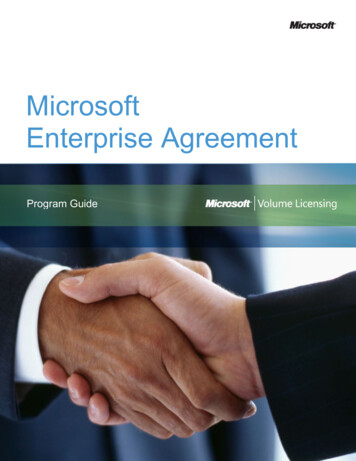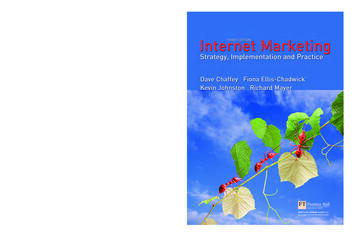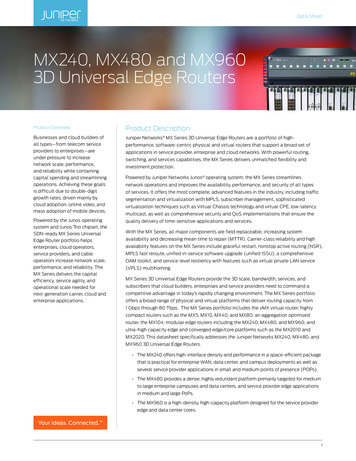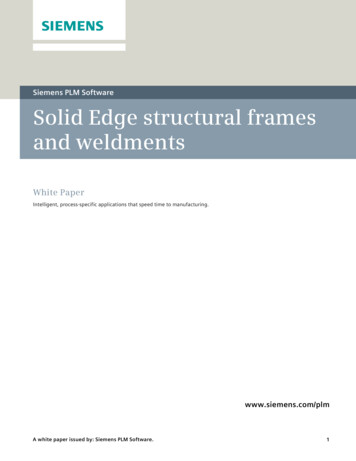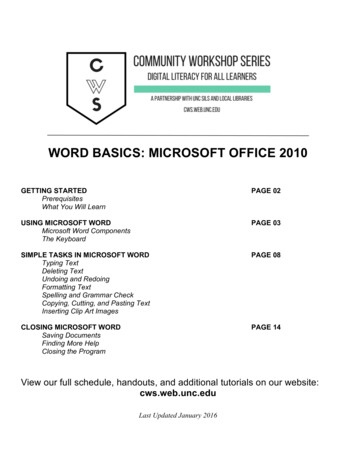![[MS-WEBMSG]: Microsoft Edge / Internet Explorer HTML5](/img/16/ms-webmsg-171003.jpg)
Transcription
[MS-WEBMSG]:Microsoft Edge / Internet Explorer HTML5 Web MessagingStandards Support DocumentIntellectual Property Rights Notice for Open Specifications Documentation Technical Documentation. Microsoft publishes Open Specifications documentation (“thisdocumentation”) for protocols, file formats, data portability, computer languages, and standardssupport. Additionally, overview documents cover inter-protocol relationships and interactions.Copyrights. This documentation is covered by Microsoft copyrights. Regardless of any otherterms that are contained in the terms of use for the Microsoft website that hosts thisdocumentation, you can make copies of it in order to develop implementations of the technologiesthat are described in this documentation and can distribute portions of it in your implementationsthat use these technologies or in your documentation as necessary to properly document theimplementation. You can also distribute in your implementation, with or without modification, anyschemas, IDLs, or code samples that are included in the documentation. This permission alsoapplies to any documents that are referenced in the Open Specifications documentation.No Trade Secrets. Microsoft does not claim any trade secret rights in this documentation.Patents. Microsoft has patents that might cover your implementations of the technologiesdescribed in the Open Specifications documentation. Neither this notice nor Microsoft's delivery ofthis documentation grants any licenses under those patents or any other Microsoft patents.However, a given Open Specifications document might be covered by the Microsoft OpenSpecifications Promise or the Microsoft Community Promise. If you would prefer a written license,or if the technologies described in this documentation are not covered by the Open SpecificationsPromise or Community Promise, as applicable, patent licenses are available by contactingiplg@microsoft.com.License Programs. To see all of the protocols in scope under a specific license program and theassociated patents, visit the Patent Map.Trademarks. The names of companies and products contained in this documentation might becovered by trademarks or similar intellectual property rights. This notice does not grant anylicenses under those rights. For a list of Microsoft trademarks, visitwww.microsoft.com/trademarks.Fictitious Names. The example companies, organizations, products, domain names, emailaddresses, logos, people, places, and events that are depicted in this documentation are fictitious.No association with any real company, organization, product, domain name, email address, logo,person, place, or event is intended or should be inferred.Reservation of Rights. All other rights are reserved, and this notice does not grant any rights otherthan as specifically described above, whether by implication, estoppel, or otherwise.Tools. The Open Specifications documentation does not require the use of Microsoft programmingtools or programming environments in order for you to develop an implementation. If you have accessto Microsoft programming tools and environments, you are free to take advantage of them. CertainOpen Specifications documents are intended for use in conjunction with publicly available standardsspecifications and network programming art and, as such, assume that the reader either is familiarwith the aforementioned material or has immediate access to it.Support. For questions and support, please contact dochelp@microsoft.com.1 / 11[MS-WEBMSG] - v20171003Microsoft Edge / Internet Explorer HTML5 Web Messaging Standards Support DocumentCopyright 2017 Microsoft CorporationRelease: October 3, 2017
Revision 1/20151.0NewReleased new document.11/2/20151.0NoneNo changes to the meaning, language, or formatting of thetechnical content.1/20/20161.1MinorClarified the meaning of the technical content.3/22/20161.1NoneNo changes to the meaning, language, or formatting of thetechnical content.7/19/20161.2MinorClarified the meaning of the technical content.11/2/20161.2NoneNo changes to the meaning, language, or formatting of thetechnical content.3/14/20171.2NoneNo changes to the meaning, language, or formatting of thetechnical content.10/3/20171.2NoneNo changes to the meaning, language, or formatting of thetechnical content.2 / 11[MS-WEBMSG] - v20171003Microsoft Edge / Internet Explorer HTML5 Web Messaging Standards Support DocumentCopyright 2017 Microsoft CorporationRelease: October 3, 2017
Table of Contents1Introduction . 41.1Glossary . 41.2References . 41.2.1Normative References . 41.2.2Informative References . 41.3Microsoft Implementations . 41.4Standards Support Requirements . 51.5Notation. 52Standards Support Statements . 72.1Normative Variations . 72.1.1[W3C-HTML5WEBMSG] Section 3 The MessageEvent interfaces . 72.1.2[W3C-HTML5WEBMSG] Section 5.3 Message ports . 82.2Clarifications . 92.3Error Handling . 92.4Security . 93Change Tracking . 104Index . 113 / 11[MS-WEBMSG] - v20171003Microsoft Edge / Internet Explorer HTML5 Web Messaging Standards Support DocumentCopyright 2017 Microsoft CorporationRelease: October 3, 2017
1IntroductionThis documented describes the level of supported provided by Microsoft web browsers for the W3CHTML5 Web Messaging specification [W3C-HTML5WEBMSG], published 19 May 2015. The [W3CHTML5WEBMSG] specification defines two mechanisms for communicating between browsing contextsin HTML documents.1.1GlossaryMAY, SHOULD, MUST, SHOULD NOT, MUST NOT: These terms (in all caps) are used as definedin [RFC2119]. All statements of optional behavior use either MAY, SHOULD, or SHOULD NOT.1.2ReferencesLinks to a document in the Microsoft Open Specifications library point to the correct section in themost recently published version of the referenced document. However, because individual documentsin the library are not updated at the same time, the section numbers in the documents may notmatch. You can confirm the correct section numbering by checking the Errata.1.2.1 Normative ReferencesWe conduct frequent surveys of the normative references to assure their continued availability. If youhave any issue with finding a normative reference, please contact dochelp@microsoft.com. We willassist you in finding the relevant information.[RFC2119] Bradner, S., "Key words for use in RFCs to Indicate Requirement Levels", BCP 14, RFC2119, March 1997, 5WEBMSG] World Wide Web Consortium, "HTML5 Web Messaging", W3C Recommendation19 May 2015, 9/1.2.2 Informative ReferencesNone.1.3Microsoft ImplementationsThe following Microsoft web browser versions implement some portion of the [W3C-HTML5WEBMSG],specification: Windows Internet Explorer 9 Windows Internet Explorer 10 Internet Explorer 11 Internet Explorer 11 for Windows 10 Microsoft EdgeEach browser version may implement multiple document rendering modes. The modes vary from oneto another in support of the standard. The following table lists the document modes supported by eachbrowser version.4 / 11[MS-WEBMSG] - v20171003Microsoft Edge / Internet Explorer HTML5 Web Messaging Standards Support DocumentCopyright 2017 Microsoft CorporationRelease: October 3, 2017
Browser VersionDocument Modes SupportedInternet Explorer 9IE9 ModeIE10 ModeIE11 ModeInternet Explorer 10IE9 ModeIE10 ModeIE11 ModeInternet Explorer 11IE9 ModeIE10 ModeIE11 ModeInternet Explorer 11 for Windows10IE9 ModeIE10 ModeIE11 ModeMicrosoft EdgeEdgeHTML ModeFor each variation presented in this document there is a list of the document modes and browserversions that exhibit the behavior described by the variation. All combinations of modes and versionsthat are not listed conform to the specification. For example, the following list for a variation indicatesthat the variation exists in three document modes in all browser versions that support these modes:Quirks Mode, IE7 Mode, and IE8 Mode (All Versions)1.4Standards Support RequirementsTo conform to [W3C-HTML5WEBMSG], a user agent must implemented all required portions of thespecification. Any optional portions that have been implemented must also be implemented asdescribed by the specification. Normative language is usually used to define both required andoptional portions. (For more information, see [RFC2119].)The following lists the sections of [W3C-HTML5WEBMSG] and whether they are considered normativeor e following notations are used in this document to differentiate between notes of clarification,variation from the specification, and points of extensibility.5 / 11[MS-WEBMSG] - v20171003Microsoft Edge / Internet Explorer HTML5 Web Messaging Standards Support DocumentCopyright 2017 Microsoft CorporationRelease: October 3, 2017
NotationExplanationC####This identifies a clarification of ambiguity in the target specification. This includes imprecisestatements, omitted information, discrepancies, and errata. This does not include data formattingclarifications.V####This identifies an intended point of variability in the target specification such as the use of MAY,SHOULD, or RECOMMENDED. (See [RFC2119].) This does not include extensibility points.E####Because the use of extensibility points (such as optional implementation-specific data) can impairinteroperability, this profile identifies such points in the target specification.For document mode and browser version notation, see also section 1.3.6 / 11[MS-WEBMSG] - v20171003Microsoft Edge / Internet Explorer HTML5 Web Messaging Standards Support DocumentCopyright 2017 Microsoft CorporationRelease: October 3, 2017
2Standards Support StatementsThis section contains a full list of variations, clarifications, and extension points in the Microsoftimplementation of [W3C-HTML5WEBMSG].2.1Normative Variations2.1.1 [W3C-HTML5WEBMSG] Section 3 The MessageEvent interfacesV0001: The lastEventId attribute is not supportedThe specification states:3. The MessageEvent interfaces.interface MessageEvent : Event {readonly attribute any data;readonly attribute DOMString origin;readonly attribute DOMString lastEventId;readonly attribute (WindowProxy or MessagePort)? source;readonly attribute MessagePort[]? ports;void initMessageEvent(DOMString typeArg, boolean canBubbleArg, boolean cancelableArg,any dataArg, DOMString originArg, DOMString lastEventIdArg, (WindowProxy orMessagePort) sourceArg, sequence MessagePort ? portsArg);};All document modes (All versions)The lastEventId attribute is not supported.V0002: The source attribute is defined with the incorrect typeThe specification states:3. The MessageEvent interfaces.interface MessageEvent : Event {readonly attribute any data;readonly attribute DOMString origin;readonly attribute DOMString lastEventId;readonly attribute (WindowProxy or MessagePort)? source;readonly attribute MessagePort[]? ports;void initMessageEvent(DOMString typeArg, boolean canBubbleArg, boolean cancelableArg,any dataArg, DOMString originArg, DOMString lastEventIdArg, (WindowProxy orMessagePort) sourceArg, sequence MessagePort ? portsArg);};All document modes (All versions)The source attribute is defined incorrectly as type Window.V0003: The ports attribute is defined with an incorrect type7 / 11[MS-WEBMSG] - v20171003Microsoft Edge / Internet Explorer HTML5 Web Messaging Standards Support DocumentCopyright 2017 Microsoft CorporationRelease: October 3, 2017
The specification states:3. The MessageEvent interfaces.interface MessageEvent : Event {readonly attribute any data;readonly attribute DOMString origin;readonly attribute DOMString lastEventId;readonly attribute (WindowProxy or MessagePort)? source;readonly attribute MessagePort[]? ports;void initMessageEvent(DOMString typeArg, boolean canBubbleArg, boolean cancelableArg,any dataArg, DOMString originArg, DOMString lastEventIdArg, (WindowProxy orMessagePort) sourceArg, sequence MessagePort ? portsArg);};All document modes (All versions)The ports attribute is defined as type any.V0004: The initMessageEvent funtion does not take the correct numer of valuesThe specification states:interface MessageEvent : Event {readonly attribute any data;readonly attribute DOMString origin;readonly attribute DOMString lastEventId;readonly attribute (WindowProxy or MessagePort)? source;readonly attribute MessagePort[]? ports;void initMessageEvent(DOMString typeArg, boolean canBubbleArg, boolean cancelableArg,any dataArg, DOMString originArg, DOMString lastEventIdArg, (WindowProxy orMessagePort) sourceArg, sequence MessagePort ? portsArg);};All document modes (All versions)The initMessageEvent function defines the sourceArg type as Window and does not support the finalargument portsArgs.2.1.2 [W3C-HTML5WEBMSG] Section 5.3 Message portsV0005: The postMessage function does not define the proper argumentsThe specification states:5.3 Message ports.interface MessagePort : EventTarget {void postMessage(any message, optional sequence Transferable transfer);void start();void close();// event handlersattribute EventHandler onmessage;8 / 11[MS-WEBMSG] - v20171003Microsoft Edge / Internet Explorer HTML5 Web Messaging Standards Support DocumentCopyright 2017 Microsoft CorporationRelease: October 3, 2017
};IE11 Mode (All versions)The postMessage function is incorrectly defined as:void postMessage(optional any message, optional any ports);2.2ClarificationsThe following subsections identify clarifications relative to [W3C-HTML5WEBMSG].2.3Error HandlingThere are no additional considerations for error handling.2.4SecurityThere are no additional security considerations.9 / 11[MS-WEBMSG] - v20171003Microsoft Edge / Internet Explorer HTML5 Web Messaging Standards Support DocumentCopyright 2017 Microsoft CorporationRelease: October 3, 2017
3Change TrackingNo table of changes is available. The document is either new or has had no changes since its lastrelease.10 / 11[MS-WEBMSG] - v20171003Microsoft Edge / Internet Explorer HTML5 Web Messaging Standards Support DocumentCopyright 2017 Microsoft CorporationRelease: October 3, 2017
4IndexCChange tracking 10GGlossary 4IInformative references 4Introduction 4NNormative references 4RReferencesinformative 4normative 4TTracking changes 1011 / 11[MS-WEBMSG] - v20171003Microsoft Edge / Internet Explorer HTML5 Web Messaging Standards Support DocumentCopyright 2017 Microsoft CorporationRelease: October 3, 2017
HTML5 Web Messaging specification [W3C-HTML5WEBMSG], published 19 May 2015. The [W3C-HTML5WEBMSG] specification defines two mechanisms for communicating between browsing contexts in HTML documents. 1.1 Glossary MAY, SHOULD, MUST, SHOULD NOT, MUST NOT: Th


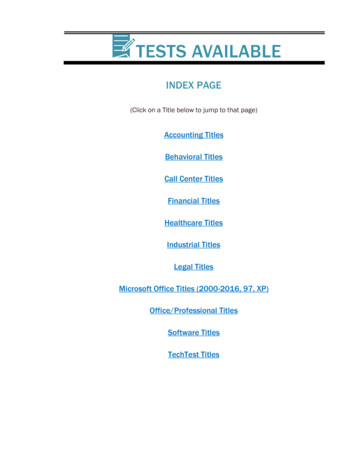
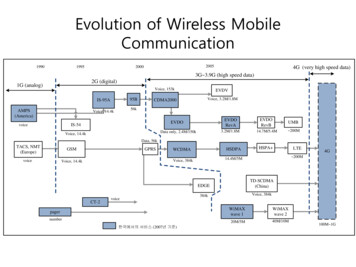
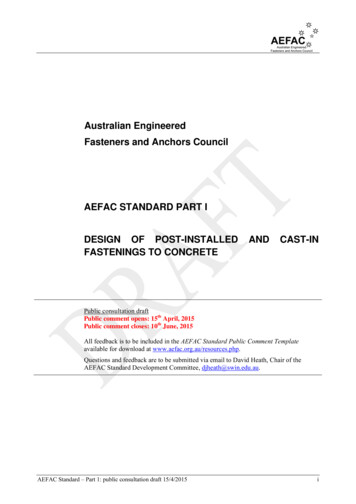
![[MS-HTML5]: Microsoft Edge / Internet Explorer HTML5 .](/img/13/ms-html5-170314.jpg)
